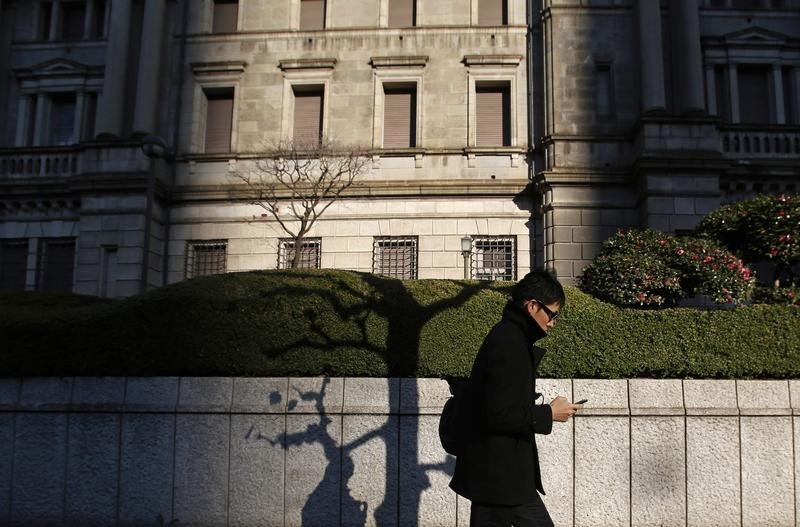By Leika Kihara
TOKYO (Reuters) - The Bank of Japan cut next fiscal year's inflation forecast on Wednesday and expanded a loan scheme aimed at boosting lending, hoping to deflect criticism it is sitting idly by as a slump in oil prices pushes inflation further away from its target.
As widely expected, the BOJ held off on expanding its massive stimulus program and maintained its pledge to increase base money at an annual pace of 80 trillion yen ($678 billion) through buying government bonds and risk assets.
In a review of its long-term estimates, the BOJ cut its core consumer inflation forecast for the year beginning in April to 1.0 percent from 1.7 percent projected three months ago.
But it slightly raised its inflation forecast for fiscal 2016 to 2.2 percent from 2.1 percent, a sign central bankers are publicly sticking to the view Japan will hit an inflation goal of 2 percent.
Markets are focusing on how Governor Haruhiko Kuroda, at his post-meeting briefing at 3:30 p.m. (0630 GMT), will reconcile the new projections with the pledge he had made that the BOJ will achieve 2 percent inflation next fiscal year.
"I want to hear if Kuroda will continue to express confidence in meeting his target in fiscal 2015 or whether he will change his assessment," said Daiju Aoki, an economist at UBS Securities.
"If the BOJ is delaying its target without easing policy again, I think there will be some disappointment in the market."
The BOJ expanded its "quantitative and qualitative easing" (QQE) less than three months ago to prevent oil price falls and a subsequent slowdown in price rises from weighing on inflation expectations.
The relentless drop in oil prices, which have nearly halved since October, has kept alive expectations the BOJ will expand QQE again soon. Some investors sold the yen ahead of Wednesday's meeting in a precautionary move against a surprise action.
The dollar dropped to a session low against the yen after the BOJ's announcement that it held monetary policy steady.
The BOJ's new price forecast is still much higher than the 0.6 percent forecast from analysts polled by Reuters, many of whom expect the bank to ease again as early as April.
The BOJ revised up next fiscal year's economic growth forecast to 2.1 percent from 1.5 percent, suggesting that a pick-up in growth will boost wages and accelerate inflation.
Many BOJ policymakers are increasingly wary of expanding QQE further with the bank's huge purchases already pushing five-year government bond yields into negative territory.
The BOJ instead extended for a year two loan schemes aimed at encouraging banks to lend more, expanding one of them by 3 trillion yen.
The BOJ issues a semi-annual report with forecasts on the economy and prices in April and October of each year. It reviews the projections at rate reviews in January and July.

($1 = 117.9900 yen)